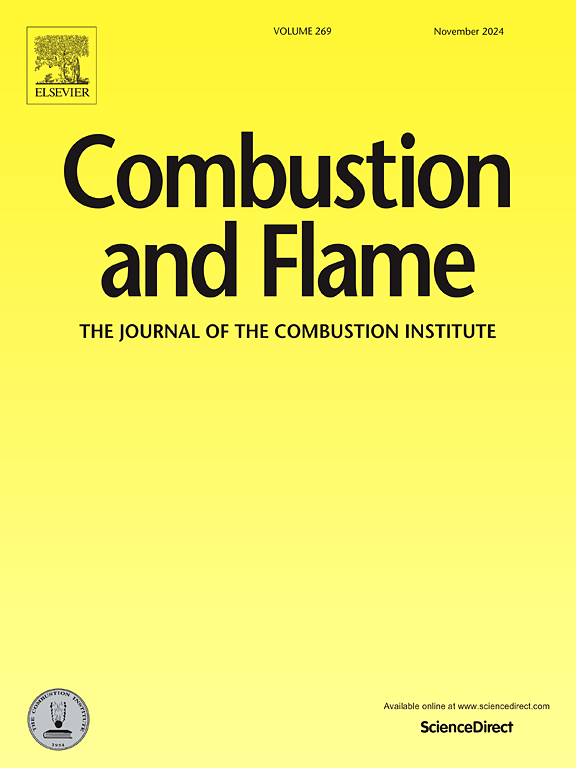Experimental characterization and 3D simulations of turbulent flames assisted by nanosecond plasma discharges
IF 6.2
2区 工程技术
Q2 ENERGY & FUELS
引用次数: 0
Abstract
This paper presents quantitative experimental data generated for the validation of plasma-assisted combustion (PAC) simulations. These data are then used to validate the phenomenological model of Castela et al. They are also useful to test other PAC models. In the experiment presented here, Nanosecond Repetitively Pulsed (NRP) discharges are applied to a lean-premixed turbulent methane-air flame initially near the lean blow-off limit. The discharges significantly enhance the combustion and stabilize the flame after a few pulses. Electrical and optical diagnostics are employed to extensively quantify the transient and steady state of the plasma-stabilization process. The flame shape is characterized by OH* chemiluminescence imaging. In the discharge region, OH density profiles are obtained by 1D laser-induced fluorescence, and the gas temperature is measured by optical emission spectroscopy measurements. The local gas temperature increases by 1250 K, and the OH number density rises sevenfold when NRP discharges are applied. These results evidence the cumulative thermal and chemical effects of NRP discharges, which are especially challenging to replicate numerically. A Large Eddy Simulation (LES) of the experiment is performed. Combustion chemistry is modeled by an analytically reduced mechanism, while the plasma discharge is described by the low-CPU cost phenomenological model of Castela et al., which aims to capture the main thermal and chemical effects induced by the discharges. The model of Castela et al. is validated in the burnt gases by the remarkable agreement between the simulations and the experiments regarding the flame shape, the local gas temperature, and the OH number density. More generally, this work demonstrates the relevance of simplified plasma models in LES solvers to simulate complex plasma-assisted burners.
纳秒等离子体放电辅助湍流火焰的实验表征和三维模拟
本文介绍了为验证等离子体辅助燃烧(PAC)模拟而生成的定量实验数据。这些数据可用于验证 Castela 等人的现象学模型,也可用于测试其他 PAC 模型。在本文介绍的实验中,纳秒重复脉冲(NRP)放电被应用于最初接近贫气吹散极限的贫气预混湍流甲烷-空气火焰。放电大大增强了燃烧,并在几个脉冲后稳定了火焰。电学和光学诊断被用来广泛量化等离子体稳定过程的瞬态和稳态。火焰形状通过 OH* 化学发光成像来表征。在放电区,通过一维激光诱导荧光获得 OH 密度曲线,并通过光学发射光谱测量气体温度。应用 NRP 放电时,局部气体温度上升了 1250 K,OH 数量密度上升了七倍。这些结果证明了 NRP 放电的累积热效应和化学效应,而这些效应在数值上的复制尤其具有挑战性。对实验进行了大涡流模拟(LES)。燃烧化学是通过分析简化机制建模的,而等离子体放电是通过 Castela 等人的低 CPU 成本现象学模型描述的,该模型旨在捕捉放电引起的主要热效应和化学效应。Castela 等人的模型在燃烧气体中的火焰形状、局部气体温度和 OH 数量密度方面的模拟结果与实验结果非常一致,从而验证了该模型的有效性。更广泛地说,这项工作证明了 LES 求解器中的简化等离子体模型与模拟复杂等离子体辅助燃烧器的相关性。
本文章由计算机程序翻译,如有差异,请以英文原文为准。
求助全文
约1分钟内获得全文
求助全文
来源期刊

Combustion and Flame
工程技术-工程:化工
CiteScore
9.50
自引率
20.50%
发文量
631
审稿时长
3.8 months
期刊介绍:
The mission of the journal is to publish high quality work from experimental, theoretical, and computational investigations on the fundamentals of combustion phenomena and closely allied matters. While submissions in all pertinent areas are welcomed, past and recent focus of the journal has been on:
Development and validation of reaction kinetics, reduction of reaction mechanisms and modeling of combustion systems, including:
Conventional, alternative and surrogate fuels;
Pollutants;
Particulate and aerosol formation and abatement;
Heterogeneous processes.
Experimental, theoretical, and computational studies of laminar and turbulent combustion phenomena, including:
Premixed and non-premixed flames;
Ignition and extinction phenomena;
Flame propagation;
Flame structure;
Instabilities and swirl;
Flame spread;
Multi-phase reactants.
Advances in diagnostic and computational methods in combustion, including:
Measurement and simulation of scalar and vector properties;
Novel techniques;
State-of-the art applications.
Fundamental investigations of combustion technologies and systems, including:
Internal combustion engines;
Gas turbines;
Small- and large-scale stationary combustion and power generation;
Catalytic combustion;
Combustion synthesis;
Combustion under extreme conditions;
New concepts.
 求助内容:
求助内容: 应助结果提醒方式:
应助结果提醒方式:


